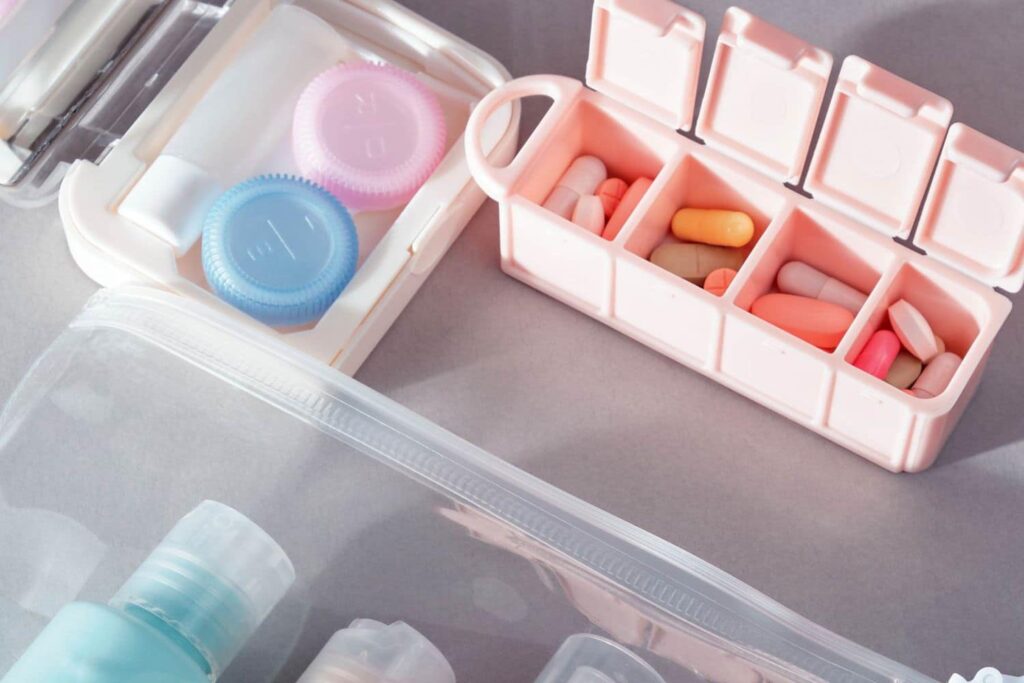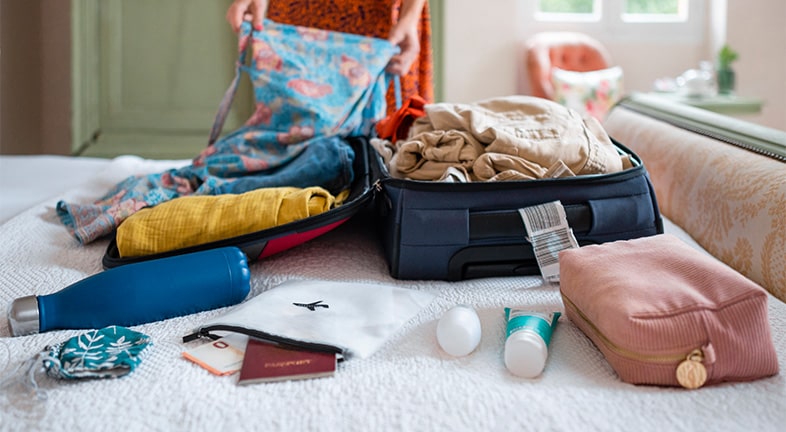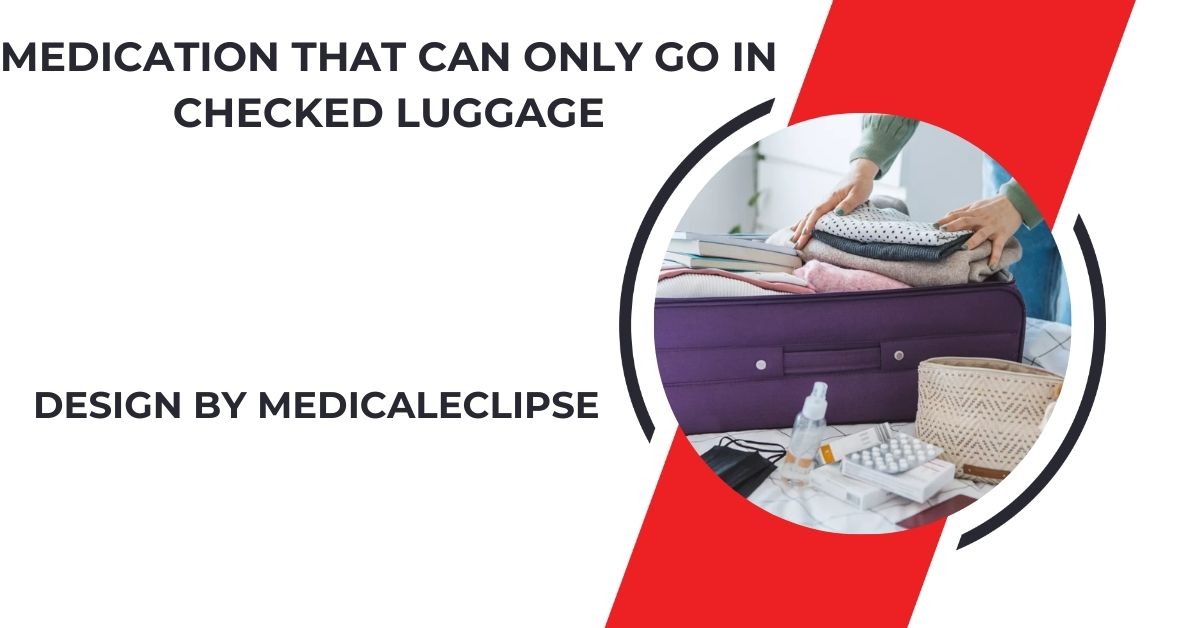Certain medications, such as liquids over 3.4 ounces, controlled substances, and temperature-sensitive drugs, must go in checked luggage. Knowing airline rules and packing carefully ensures smooth travel.
This article will help you navigate the guidelines surrounding medications that should only go in checked luggage and provide tips for safe travel.
Understanding Airline Regulations:

When traveling by air, it’s crucial to familiarize yourself with both airline and Transportation Security Administration (TSA) regulations regarding medications. Each airline may have its own policies regarding the types of medications that can be carried on board versus those that need to be placed in checked luggage.
Here are some key points to consider:
Liquid Medications:
Many airlines allow you to bring liquid medications in carry-on luggage, but if the quantity exceeds the TSA’s limit (usually 3.4 ounces or 100 milliliters), it must be placed in checked baggage. Always check the airline’s specific guidelines regarding liquid medications. If your liquid medication exceeds this limit, consider obtaining a larger container if your trip is lengthy, or request a smaller supply from your healthcare provider.
Controlled Substances:
Medications classified as controlled substances (such as certain pain medications and stimulants) might be required to be kept in checked luggage due to stricter regulations. The TSA and many airlines have additional requirements for carrying these medications, including proof of prescription and potential restrictions on how much you can bring. It’s important to carry a copy of your prescription and a doctor’s note to avoid any complications, particularly if you are traveling internationally where laws may differ significantly.
Temperature-Sensitive Medications:
Some medications, such as insulin, certain antibiotics, and biologics, need to be stored at specific temperatures to maintain their efficacy. If you are traveling to a destination with extreme temperatures—such as a very hot or very cold climate—it might be safer to keep these medications in checked luggage, where they can be insulated and stored properly. You can also invest in temperature-controlled medication travel bags designed to keep medications at the required temperature for extended periods.
Types of Medications Typically Required in Checked Luggage:
Certain medications are more likely to need to be checked rather than carried on. These include:
- Bulk Supplies: If you need to travel with large quantities of medication (such as insulin or other injectable medications), they may need to be checked due to size restrictions in carry-on bags. Consider dividing your medication into smaller containers if possible, but ensure each is clearly labeled.
- Non-Prescription Medications: While most over-the-counter medications can be carried in hand luggage, if you are bringing a large supply (for example, for a family vacation), consider checking them to avoid carrying excess weight and volume. This can include vitamins, supplements, and pain relievers.
- Medication Kits: If you have a comprehensive medication kit (including syringes, alcohol wipes, etc.), this may be more appropriate for checked luggage, as it can be bulky and heavy. Additionally, ensure that all components of your kit are legal at your destination to avoid any issues.
Tips for Traveling with Medications in Checked Luggage:

Traveling with medications can be straightforward if you follow these tips:
- Prepare in Advance: Always check with your airline for their specific policies regarding medications. This will help you understand what can and cannot be taken on board. Additionally, consult with your healthcare provider about your travel plans; they may suggest alternative medications or dosages that are easier to transport.
- Keep Documentation Handy: Always carry a copy of your prescriptions and a doctor’s note detailing your medical condition and the necessity of the medications. This can be crucial if you face questions or issues at security or customs. Also, consider keeping a list of your medications, including dosages and frequency, in case you need to refill prescriptions while away.
- Pack Smart: Use a sturdy, waterproof bag to store your medications in checked luggage. Include a thermometer if you are carrying temperature-sensitive medications. Packing materials like bubble wrap or foam can help protect fragile medications from breakage during transit.
- Label Everything: Clearly label your medications with your name and contact information, especially if they are in checked luggage. This can help avoid any confusion or loss. You can also add specific storage instructions to ensure proper handling.
- Notify the Airline: If you are carrying controlled substances or large quantities of medication, inform your airline in advance. This ensures they can accommodate any special requirements and may help expedite any security processes at the airport.
- Know the Destination Regulations: If you are traveling internationally, research the medication laws of your destination country. Some medications that are legal in one country may be restricted or banned in another. Countries often have strict rules regarding controlled substances, and you may need to apply for permission or carry additional documentation.
- Consider Travel Insurance: If you frequently travel with medications, consider obtaining travel insurance that covers lost luggage or medical emergencies. This can provide peace of mind if your medications are lost, stolen, or damaged during travel.
- Emergency Contact Information: Ensure you have access to your healthcare provider or pharmacy in case of emergencies. Store important contact numbers in your phone or keep them printed out in your luggage.
- Plan for Delays: Travel delays can occur, so pack a little extra medication if you can. This ensures you won’t run out if your travel plans change unexpectedly.
- Be Prepared for Security Checks: Be aware that medications can trigger additional scrutiny during security checks. Be cooperative and have your documentation ready to make the process smoother.
FAQ’s
- What types of medications must go in checked luggage?
Medications that must be checked include liquid medications over 3.4 ounces, controlled substances, and temperature-sensitive drugs.
- Can I carry liquid medications on the plane?
Yes, you can bring liquid medications in carry-on luggage as long as they do not exceed 3.4 ounces (100 milliliters).
- Do I need a prescription for controlled substances?
Yes, you should carry a copy of your prescription and a doctor’s note for controlled substances to avoid complications.
- How should I pack temperature-sensitive medications?
Use insulated bags and pack them in checked luggage to maintain the required temperature.
- What should I do if I’m traveling internationally with medication?
Research the medication regulations of your destination country, as some drugs may be restricted or banned
Conclusion
Knowing which medications need to go in checked luggage can greatly improve your travel experience. Familiarize yourself with airline policies, prepare necessary documentation, and pack wisely to ensure a smooth journey. Whether for business or leisure, being organized helps navigate the complexities of flying with medications safely. Always prioritize your health and enjoy your travels with confidence!

Leave a Reply